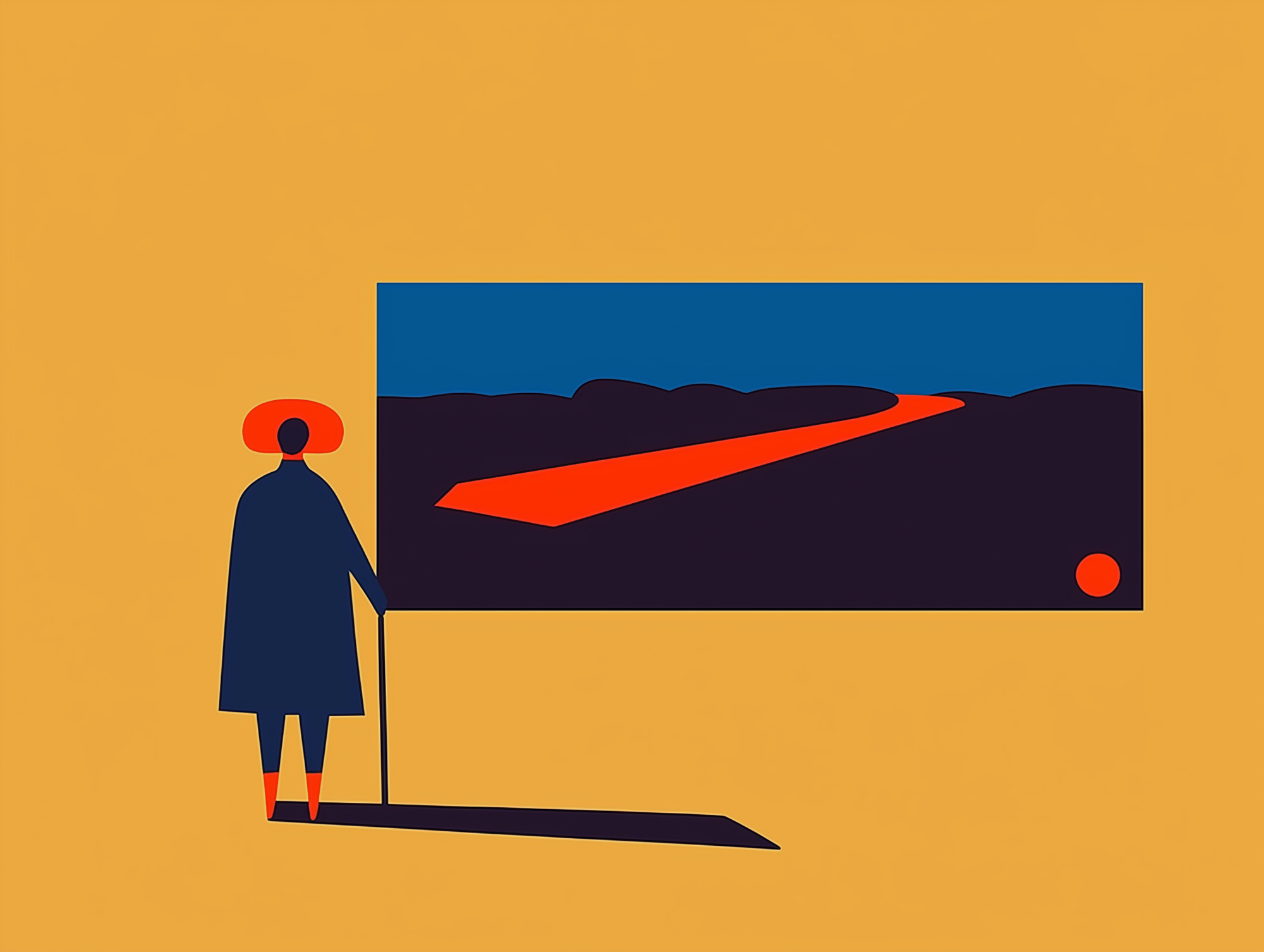3 Mental Shifts to Become a Full-Time Creator
Want to become a full-time creator? The secret isn't talent or fancy gear. It's a fundamental mindset shift that anyone can learn - a set of mental habits that separate the professionals from the perpetual amateurs.

You're standing at the edge, aren't you? Creating content already, maybe even earning a bit, but looking across at the full-time creators and wondering what it would take to join them. I've been exactly where you are - in that frustrating limbo between hobby and profession, one foot on either side of the divide.
After speaking with dozens of creators who've made this leap (and stumbling through it myself), I've realised something important: the bridge isn't built from better cameras or natural talent. It's built from specific mental shifts that transform how you approach your work.
I had a brilliant chat with Matthew on our podcast about this recently. We dug into what actually separates the amateurs from the professionals in the creator world. The answer wasn't what most people think.
So consider this your basecamp. You've got your gear packed, you're looking at the path ahead, and you're ready to set off. These three mindset shifts are your map for the journey from where you are to where you want to be.
Prefer to listen? Here's the full episode
Writer's Block Doesn't Exist (Well, Sort Of)
The first sign you're still in amateur territory is when you find yourself waiting for inspiration to strike. I used to be proper guilty of this.
I'd be scrolling through TikTok at midnight, suddenly get an idea for a blog post or video, and frantically type notes into my phone. Then I'd go weeks without creating anything because, well, the muse hadn't visited, had she?
This feast-or-famine approach is fine when creation is just a hobby. But when your income depends on it? Total nightmare.
Matthew talked about this on the podcast - how he'd be cutting grass in the rain for a job and couldn't exactly tell his boss, "Sorry mate, not feeling particularly inspired to cut grass today." You'd get sacked on the spot, wouldn't you?
One of the most helpful conversations I've had about this was with Colin, who completely changed how he manages ideas and tasks. He was talking about how he'd get overwhelmed with ideas and try to schedule them all, but then end up just dragging tasks from one week to the next in Asana.
His solution was brilliant in its simplicity:
- Every new idea goes into an inbox first - no dates attached, no pressure
- Once a week, he reviews that inbox and moves good ideas to a backlog
- Only 1-2 tasks per day actually make it onto his calendar
"Monday-planning-me is the boss," he said. "I'm disobeying the boss if I let new ideas jump straight to my calendar!"
I've since nicked this approach, and it's been a game-changer. Rather than feeling like I need to act on every idea immediately, I've got a system that lets me capture everything without drowning in it.
Some other things that seem to help with the whole "I'm not feeling inspired" problem:
Walking works wonders for me. I'll go for a wander at lunchtime and just chat ideas into my phone's voice memo app. Sometimes I'll transcribe them later or even feed them to Claude to structure them a bit. I feel slightly daft talking to myself while walking around Glasgow, but it works.
Location changes help too. I often find myself stuck when trying to write at home, but as soon as I get to a café or co-working space, it all starts flowing again. Something about being surrounded by other people getting stuff done is weirdly motivating.
A wee trick I've started using is leaving myself something fun to do first thing the next day. Like Hemingway stopping mid-sentence so he knew exactly where to pick up, I'll deliberately save an enjoyable bit of a project for tomorrow morning. Gets me right back into it without the dread of starting.
Motivation Is Fickle (And That's Okay)
The second amateur trap I keep falling into is waiting until I feel motivated to create. To be honest, I'm still working on this one.
You know those days where you wake up and just absolutely cannot be arsed doing anything creative? Yeah, that's most days for professionals. They just create anyway.
I loved Matthew's quote from Chuck Close on the podcast: "Inspiration is for amateurs. The rest of us just show up and get to work." Bit harsh maybe, but there's a truth to it.
I think this is the clearest dividing line between hobbyists and professionals. Amateurs create when they feel like it. Professionals create because it's Tuesday and that's what they do on Tuesdays.
Look, I'm not saying it's easy. The last thing I want is to paint some picture where professional creators are these discipline machines who never struggle to get going. That's rubbish. I know plenty of full-time creators who still battle with this daily.
The difference is they've accepted that motivation is basically useless as a foundation for consistent creation. It's like Scottish weather - lovely when it's here, but you'd be mental to count on it.
Cal Newport talks about rituals before work, and I think there's something to that. It's not about forcing motivation - it's about creating little habits that tell your brain "right, it's creation time now."
For me, it's making a specific coffee and putting on instrumental music (lyrics distract me). That small routine helps me shift gears even when I'm not feeling it.
I've also found that tracking streaks can be surprisingly effective. There's something weirdly satisfying about not breaking the chain. I use a simple habit tracker app, nothing fancy, but seeing those little ticks add up makes a difference on the tough days.
And honestly? Sometimes I just bribe myself. "Just 20 minutes of writing, then you can have a biscuit." Whatever works, right?
Ideas Aren't Precious (But Execution Is)
The third amateur mindset I've struggled with is being terrified of people nicking my ideas.
I'm that guy who's registered domain names at 3am because I was convinced I'd just had the most original idea in the world and someone would beat me to it. I've got a folder of half-baked projects I never launched because they weren't "ready." (And by ready, I mean perfect enough that no one could possibly criticize them).
Matthew and I had a laugh about this on the podcast. He interviewed this tabletop game designer Mike Hutchinson who said something like, "I don't want your ideas - I've got 600 of my own that will take a lifetime to implement."
That hit me right between the eyes. Ideas are ten a penny. It's the execution that's rare and valuable.
I've slowly learned that sharing work earlier actually improves it faster. The feedback you get on an imperfect project is worth far more than the mythical perfect launch you're dreaming of.
Take this blog, for instance. An amateur mindset would be to write ten drafts, design a perfect site, and finally launch when everything's polished. The professional approach is to get something decent out the door, see how people respond, and improve from there.
Documentation is another approach that's worked well for some creator friends. Instead of hiding your project until it's finished, document the journey of creating it. Turn the process itself into content. It builds interest, creates accountability, and establishes that this was your idea even if someone else tries something similar.
I'm still working on this one, if I'm honest. There's always that little voice saying "but what if someone steals it?" But I'm trying to replace it with "well, they probably won't do it exactly like I would anyway."
From Theory to Practice
These mindset shifts don't happen overnight. I'm still very much in the middle of them myself. Some days I nail it, other days I'm back to scrolling Twitter waiting for inspiration to strike.
But I've noticed that as I've leaned into these shifts - creating systems for ideas, showing up regardless of motivation, and sharing work earlier - the whole experience of creation has become less fraught and more sustainable.
If you're trying to make the leap from hobby creator to professional, maybe try a few small experiments:
- Set up a simple idea capture system (I use Notion, but even a notes app works)
- Schedule just two 30-minute creation sessions next week, and treat them as non-negotiable
- Share something you're working on before you feel totally ready
The brilliant thing is, you don't need to master all of this before you can start earning from your creative work. Often, having someone pay you - even a small amount - accelerates these mindset shifts naturally. There's nothing like a paying customer to clarify your priorities.
I chatted with a creator recently who started with just three paying customers for her first product. It wasn't perfect, but those three people gave her enough feedback and validation to improve it. Now she's got hundreds of customers and a thriving business. She didn't wait to become a "professional" before starting - the act of starting helped her become one.
Nothing about this journey is linear or clean. Some days you'll feel like a total amateur, and other days you'll surprise yourself with your professionalism. That's normal.
The good news is that unlike natural talent (which you either have or don't), these mindset shifts are available to anyone willing to practice them. They're skills, not traits.
So if you're creating stuff but dreaming of doing it full-time, have a think about where your mindset might be holding you back. Are you waiting for inspiration, or have you built systems to capture and develop ideas? Are you creating only when motivated, or have you established some baseline discipline? Are you hiding your work until it's perfect, or sharing it while it's still evolving?
Small shifts in these areas can make a massive difference in your journey from amateur to professional creator. They certainly have for me.
Set up the most basic version of an idea capture system this week. Could be a dedicated note on your phone, a small notebook, or a voice memo folder. The key is making it frictionless - you want to capture ideas instantly without interrupting your day.
Thinking you need to feel "professional" before you can act professionally. The truth is, most full-time creators still feel like they're winging it half the time. Start with the behaviors, and the identity will follow.
Find one creator friend who's at roughly the same stage as you. Commit to sharing work with each other weekly, even if it's not finished. This creates gentle accountability without the pressure of going fully public.

